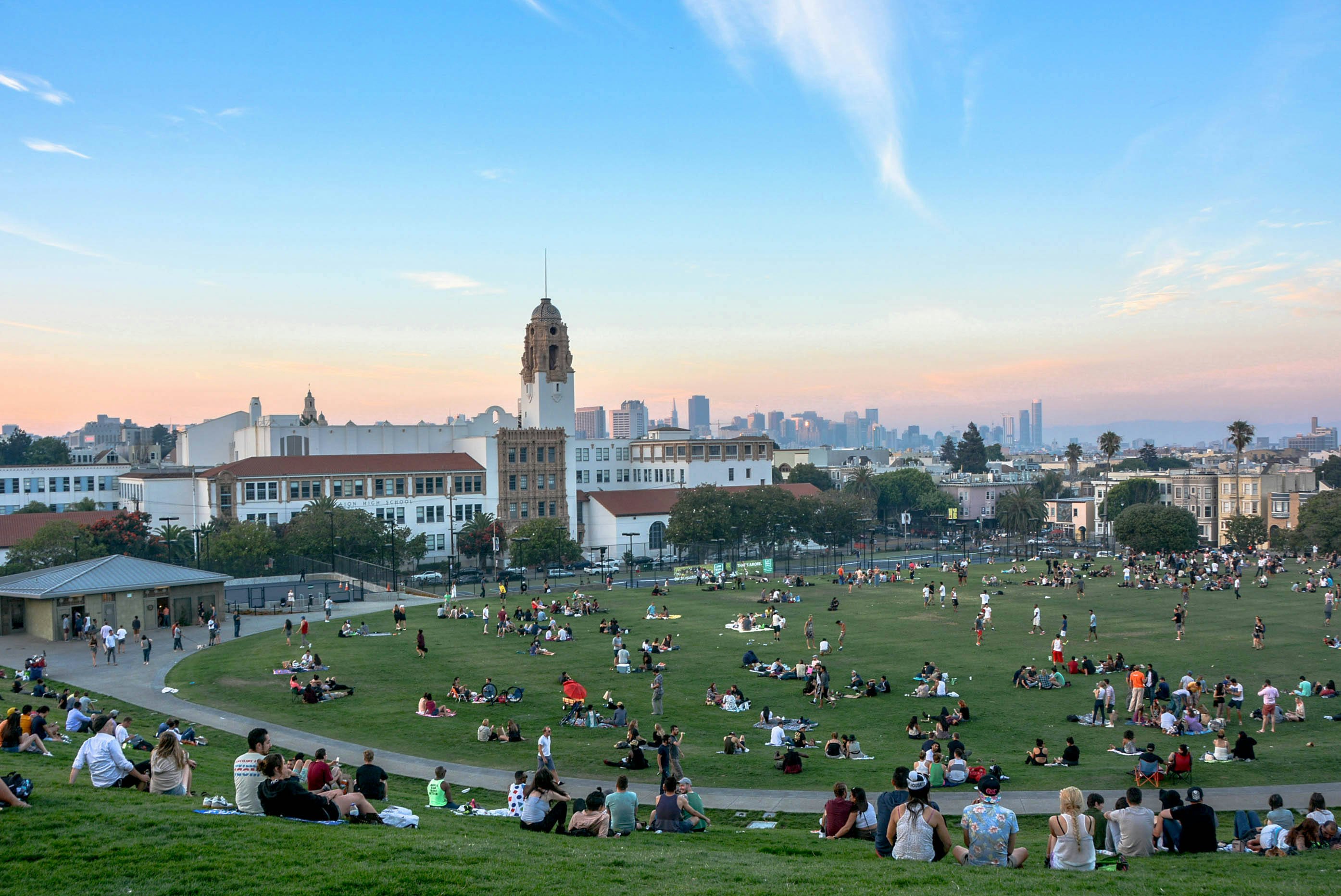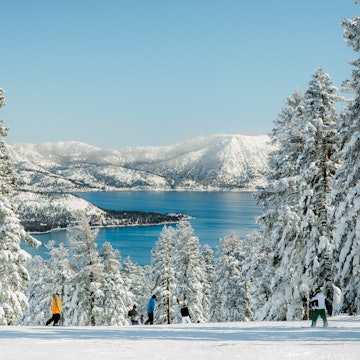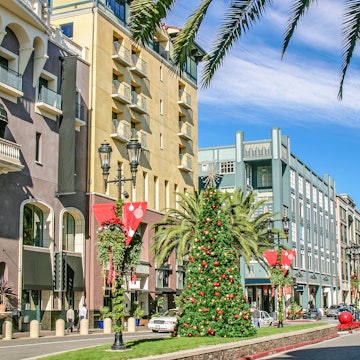
Experience San Francisco like a local with these free things to do

Feb 12, 2024 • 10 min read

See San Francisco on a budget with these free local experiences © georgeclerk / Getty Images
Taking up a small piece of real estate only 7 miles wide and 7 miles long, space in San Francisco is at a premium which is partly why it is expensive to live here – and to visit. However, it is still possible to explore some of the best things San Francisco offers at no cost.
There are, of course, well-known free things that every visitor loves to do, like seeing the sea lions at Pier 39 and browsing the City Lights bookstore (both great ways to spend the day). This list is more of a local's take on how we like to spend our days and not our money.
With these free activities, you'll see a truer cross-section of the people who live in San Francisco and get to experience local SF life for yourself.
1. Join the roller skaters in Golden Gate Park
In the northeast corner of Golden Gate Park lies a treasure that not all visitors or even locals know about. Skatin’ Place (labeled as 6th Ave Skate Park on Google Maps) is an outdoor roller rink that’s actually been around since 1984, and hosts joyful roller discos on Friday evenings and Sundays afternoons, all coordinated by local “Godfather of Skate,” David J Miles (who also founded Western Addition indoor roller rink Church of 8 Wheels).
A psychedelic roller skate ground mural was painted on the rink in 2022, and pays tribute to GGP’s wild 1970s rollerskating days, pre-rink. All ages, levels (and outfits!) are welcome. Advanced skaters use the middle rink for solo and group roller dances. Smaller kids use the northern tip of the oval to skate together in a quieter, slower-moving area.
Planning tip: If you don’t have your own skates, the closest rentals are currently for rollerblades only from Unlimited Biking ($25 for 24 hours) 1 mile southeast in the Lower Haight (skate back to the park!). If you want to keep your Skatin’ Place visit free without the skate rentals, almost just as fun is sitting on the bordering grassy areas to watch skaters whizz by with mesmerizing grace.

2. Learn about BDSM culture in the Leather & LGBTQ Cultural District
The distinctly San Francisco Folsom Street Fair has been celebrating BDSM culture and educating the public about it for 40 years in what is now the Leather & LGBTQ Cultural District in SoMa. Dog head masks, nipple clamps, black leather chest harnesses, and lots of skin are the norm at this annual September festival. Plenty of booths sell whips and ball gags if you accidentally left yours at home.
Folsom is a party where you can get consensually flogged publicly, or just sip on a beer and munch on food truck eats while marinating in the scantily-clad ambiance. Admission is for those 18-plus and is free, though a suggested donation of $10 goes toward public health nonprofits. Be respectful of others, as this is a community celebration and safe space.
Wear sunscreen and keep your reusable bottle full at the water-filling stations, as September is one of the sunniest months in SF’s unique climate calendar. Duck into one of the historic watering holes along Folsom for some shade, like kink coffee shop Wicked Grounds or leather bar SF Eagle. For those wanting something more intimate or hardcore, look to private parties and smaller niche festivals that occur around Folsom time.
Local tip: Year-round, the district sponsors events ranging from Erotic Storytelling Hour to monthly kink arts fests for Second Saturdays.
3. Hike – or bike – across the city via the Crosstown Trail
After years of volunteer-run planning, the Crosstown Trail officially debuted in 2019. The feat is all in the name — it is possible to hike across San Francisco. The ambitious 17-mile trek is divided into five sections, connecting a series of community gardens, hidden trails, public parks, and tiled staircases. It begins (or ends) in the southeast corner of the city in the Candlestick Park Recreation Area, goes through Glen Canyon Park, Golden Gate Heights, Golden Gate Park, and ends (or begins) in the northwest corner at Lands End. For bikes, alternate routes on nearby roads are given when encountering stair sections.
There’s no signage and the trail isn’t continuous, but using the trail app, the website’s downloadable maps, or downloadable route descriptions will assist with navigation, including vital bathroom info. Don’t feel obligated to do the entire hike, which has a (very rough) completion time of around 6.5 hours. Instead, linger in neighborhoods more interesting to you, or just focus on one or two from the get-go.
Planning tip: If doing the whole thing, you'll need to take public transportation or a ride share (if not biking) from the finish as you’ll end up on the opposite end of the city. Don't forget to wear comfortable shoes that are good for multiple types of terrain.

4. Stretch your legs walking to windblown Lands End
Considered the rockiest, wildest corner of San Francisco, Lands End stretches from the northwest corner of the Outer Richmond to the luxurious northwest Sea Cliff neighborhood. It has an eclectic and quirky collection of sights along its trails, ranging from the ruins of Sutro Baths to World War II shipwrecks to a semi-hidden heart sculpture made of beach rocks – all among century-old, windblown Monterey cypress trees and towering pines lining oceanside cliff trails.
You can make your visit short and sweet, or long and moderately strenuous – both options are full experiences. Lands End can also get windy, so dress accordingly. Take advantage of the Lands End Lookout by the main parking lot, which has bathrooms, water-filling station, and a gift shop.
Planning tip: If you are still feeling energetic after your hike, head a mile further south to the free Ocean Beach fire pits, which are open during burn season from March through October. Swing by the Safeway on La Playa on the way for firewood and snacks.
5. Be an early bloomer at the SF Flower Mart
Countries like Japan have early morning fish markets that require a dawn entry for the best goods and most visually stunning experience. In San Francisco, there’s a better-smelling equivalent at the San Francisco Flower Market. Well, almost. The flower mart is one of those SF experiences that feels cool — it’s not manicured and rooted like the gorgeous SF Botanical Garden, it is its own floral beast with an industrial edge. While industry badge holders looking to buy wholesale (usually florists and designers) can enter as early as 3am, the general public can enter for free Wednesdays through Saturdays from 8am to 1pm.
With more than 45 vendors selling farm-fresh flowers, ranging from a sea of fragrant purple orchids to colorful lei during graduation season, the market also sells blooming plants, greens, silk products and floral supplies for flower enthusiasts, dabblers, or just the florally curious.
Go to gawk and smell the roses, or make your own floral arrangements for special occasions, like weddings or Mother’s Day. There’s a designated parking lot on 6th St at $1.50 per every 15 minutes. Otherwise, take Muni bus 45, Muni metro line N, or Caltrain.
Detour: Grab a quick lunch afterward at Turtle Tower’s 6th St location, a 4-minute walk west. Or walk 18 minutes southeast to food truck parks SparkSocial or Parklab Gardens in Mission Bay. Or, if you need a pick-me-up, walk 11 minutes north to Delah Coffee, SF’s first Yemeni cafe, for an aromatic Sana’ani (house coffee with cardamom).

6. Clamber up the 16th Avenue Tiled Steps
There are more than 600 public stairways in San Francisco, but few are as gorgeous as our collection of tiled ones, most of which are from artists Aileen Barr and Colette Crutcher. The 16th Avenue Tiled Steps at Moraga Street was their first tiled step collaboration, completed in 2005 as a community beautification and unification project.
A theme of sea-to-stars unfolds as the 163 stairs ascend. Scenes from the ocean floor show seashells and colorful fish, blending into browns and oranges of the earth section, up to a bird-filled blue sky, a galaxy of iridescent stars and moon, and finally a brilliant sun. The view from the top reveals rows of Sunset District houses that lead to the grand Pacific Ocean. Keep climbing another set of stairs behind you to reach Grandview Heights Park for what is indeed a grand view of the city from an even higher vantage point than the tiled steps.
About an 8-minute walk north of Grandview gets you to the lesser-known Hidden Garden Steps, also along 16th Ave, between Kirkham and Lawton. Its show-stopping centerpiece is a brown salamander whose body curves with the 26 steps it spans. Both sets of steps are also part of the citywide Crosstown Trail (see above).
Planning tip: In the quiet residential Golden Gate Heights neighborhood, street parking abounds, but car break-ins are common as the steps have grown in popularity. Don’t leave valuables in the car, or travel there by bus – take Muni buses 28 or 66.
7. See three innings of an SF Giants game for free
The back of Oracle Park has a hidden spot for seeing three innings of an SF Giants baseball game for free. The "viewing point" is inside Triples Alley, whose gated back entrance is located on the Portwalk along McCovey Cove. There’s no signage for the "viewing point" (not all park staff are familiar with it) and there’s no early entry since the space is a pre-game party area for box seat patrons. You can only enter after the first pitch, but you can hear the announcements, music, and national anthem while waiting to get in (bring sun protection and water).
Once inside, enjoy the coolness of the shade and relish feeling like part of a secret sports club. Bring glasses if you need them, or a pair of binoculars, since the vantage point is in the outfield where you’ll mostly see the backsides of players. There is a railing to lean on, but no seats. If it’s not crowded, you can sometimes stay beyond three innings — the whole game, even. Just keep in mind that there are no bathrooms or food vendors here.
If you’re of age, you can duck into the Public House bar at the front of the stadium to watch the game on 26 flat-screen TVs. Alternatively, if you somehow know someone with a kayak or boat, paddle out on McCovey Cove to absorb game ambiance with a "tailgate party" on the water.
Parking for Oracle Park is expensive (the cheapest option is to book a $20 spot a few blocks away on an app like SpotHero), so consider taking Muni metro lines T or N, or Caltrain.
Local tip: For affordable eats in the area, check out $3 Taco Tuesdays Underdogs Cantina across from the park on King St, or for a quicker bite, chow down on a modern SF staple stationed outside the main stadium gates — bacon-wrapped street cart hot dogs topped with jalapeños and grilled onions for (an inflated) $10.

8. Spend the day people-watching at Dolores Park
No matter how you feel about the changing city (and therefore Dolores Park and its symbol of Mission District gentrification), people-watching in this desirably sunny area never gets old. From fire dancing to drum circles to acrobatics and DJ sets, an eclectic mix of people can always be found at the grassy 16-acre park.
Local Latino families, international tech workers, LGBTIQ+ folks from the nearby Castro, and hipsters coexist in the name of relaxation and fun. Informal food and drink vendors also rotate to keep things fresh, from pizza to lumpia (spring rolls) to psychedelic mushroom chocolates and weed banana bread.
“Dolo” completed a renovation in 2016, with more open space, picnic tables, two sets of bathrooms, and a cool playground for kids. The park is easily accessible via the J Church Muni metro line and Muni buses 33 and 22. Bike racks lie on the park border, and taking rideshares is also a popular choice. Car parking can be difficult, but it’s not impossible if you’re willing to walk a couple of blocks.
Bring a blanket and pick up some food nearby before choosing your grassy patch. Don’t forget to pack up your trash and sort it at the receptacles bordering the park.
Other free things to do in San Francisco
To keep up with other (mostly) free activities in the city, browse local event calendars like those of SFFunCheap, SF’s Cultural Districts, SF Recreation & Parks, SF Parks Alliance, and Golden Gate National Parks Conservancy for live music, dance performances, other street festivals, and more.















